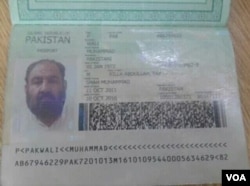An Iranian diplomat has rejected allegations Tehran had close ties and had been covertly working with Afghan Taliban chief Mullah Mansoor, who was killed in a U.S. drone strike.
The fatal attack against Mansoor took place in southwestern Pakistan May 21 while he was returning from Iran. U.S. officials say the Taliban leader freely undertook journeys to Iran, where his family lives.
Tehran’s ambassador to Islamabad, Mehdi Honardoost, while delivering a public talk at the Institute of Strategic Studies, said cooperation with a “terrorist group” like the Taliban is out of the question for the Iranian government.
“He [Mansoor] was the head of the Taliban in Afghanistan,” said the Iranian envoy. "You know, 16 years back we were exposed to the fight with the Taliban because they attacked our consul-general and they killed all of our diplomats."
He was referring to the execution of eight Iranian diplomats in the northern Afghan city of Mazar-e-Sharif that brought Shi’ite Iran to the brink of an all out war with Afghanistan in 1998 when the Sunni-based Islamist Taliban was in control of most of the war-hit country.
Iran funded and armed Afghanistan’s Northern Alliance in its fight against the ruling Taliban before the U.S.-led military invasion of the country that ousted the Islamist group in 2001.
“How can we [come with] good terms with these guys? According to the information that I have, Iran never, and never supported these guys,” said Honardoost.
A Pakistani passport that slain Taliban leader Mansoor was allegedly carrying under a pseudonym, Wali Mohammad, had a valid Iranian visa and his travel history showed he undertook at least two trips in recent months to Iran, including the one that led to his killing.
When asked whether Tehran knew about Mansoor’s presence in his country, the Iranian ambassador said “maybe, everything is possible.” He noted that Iran shares long borders and territories with both Pakistan and Afghanistan.
It is widely perceived that the rise of the Syrian-based Islamic State terrorist group in Afghanistan has become a major worry for Iran and compelled it to win cooperation from its longtime adversary, the Taliban, to secure border areas.
According to media reports, Tehran is also providing the Taliban with funds and weapons in its bid to keep Islamic State out of Afghan areas bordering Iran.





